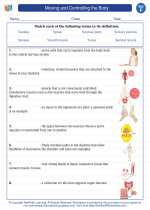Cells
Cells are the basic structural and functional units of all living organisms. They are often called the "building blocks of life." Cells can vary in size, shape, and function, but they all have certain features in common.
Cell Structure
Cells are enclosed by a cell membrane, which separates the interior of the cell from its external environment. Within the cell membrane, there is cytoplasm, a gel-like substance that contains various organelles, including the nucleus, mitochondria, endoplasmic reticulum, and more.
Types of Cells
There are two main types of cells: prokaryotic cells and eukaryotic cells. Prokaryotic cells, such as bacteria, do not have a nucleus or membrane-bound organelles. Eukaryotic cells, which make up plants, animals, fungi, and protists, have a nucleus and membrane-bound organelles.
Cell Functions
Cells perform a variety of functions that are essential for life, including metabolism, growth, reproduction, and responding to stimuli. Different types of cells have different specialized functions, such as nerve cells transmitting signals, muscle cells contracting, and red blood cells carrying oxygen.
Cell Division
Cells reproduce through a process called cell division. In eukaryotic cells, this process involves two main stages: mitosis, in which the cell's nucleus divides, and cytokinesis, in which the cell's cytoplasm divides, resulting in two daughter cells.
Cell Theory
Cell theory is a fundamental principle in biology that states: 1) all living organisms are composed of one or more cells, 2) the cell is the basic unit of structure and organization in organisms, and 3) all cells come from pre-existing cells.
Study Guide
- What is the function of the cell membrane?
- What are the differences between prokaryotic and eukaryotic cells?
- Describe the process of cell division in eukaryotic cells.
- Explain the principles of cell theory.
- Give examples of specialized cell functions in the human body.
◂Science Worksheets and Study Guides Sixth Grade. Moving and Controlling the Body
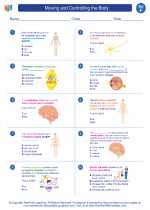
 Worksheet/Answer key
Worksheet/Answer key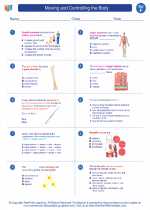
 Worksheet/Answer key
Worksheet/Answer key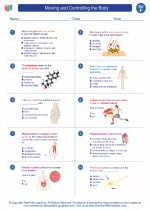
 Vocabulary/Answer key
Vocabulary/Answer key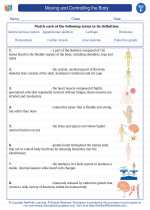
 Vocabulary/Answer key
Vocabulary/Answer key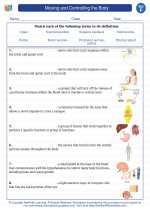
 Vocabulary/Answer key
Vocabulary/Answer key